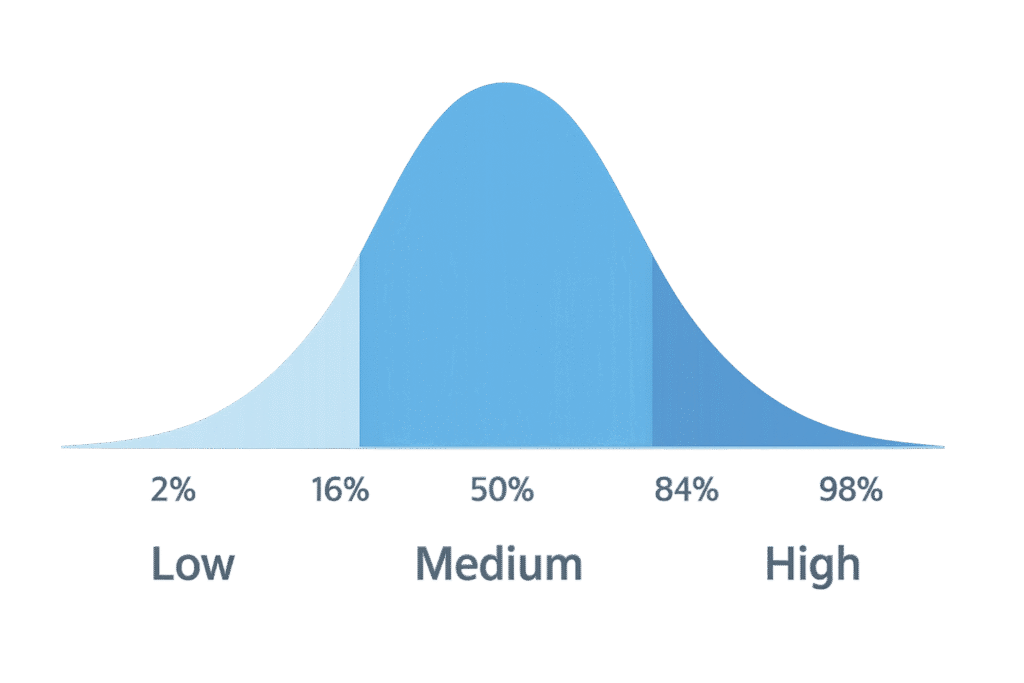Neuroticism
Awareness of emotions and how strongly they are experienced.
Where are you on the neuroticism curve?

Low
Calm, steady, and resilient under pressure. Rarely overwhelmed, but may sometimes overlook emotional cues in others.
Medium
Experiences a full range of emotions but generally stays steady. Can recover from stress with moderate effort.
High
Emotionally aware and responsive. Feels things deeply and may experience worry or stress more intensely, but also strong empathy and care.

Neuroticism Facets
Anxiety – Feeling worried or nervous at times.
Anger – Experiencing frustration or irritability.
Depression – Feeling sadness or discouragement.
Self-Consciousness – Caring deeply about how others see you.
Immoderation – Struggling to resist impulses.
Vulnerability – Feeling easily stressed or overwhelmed.
Anxiety

High: You often feel tension or unease, but your awareness of it helps you stay prepared and thoughtful. You’re learning to find peace within change.
Medium: You experience some worry but manage it with perspective. You know how to calm yourself when life feels unpredictable.
Low: You tend to stay calm and grounded, even in uncertain situations. Your steady presence helps others feel at ease.
Anger
High: You feel anger strongly when things feel unfair or hurtful. Your passion can motivate you to stand up for what matters—especially when guided by compassion.
Medium: You express irritation when it’s justified but know when to let small things go. You use your emotions to create understanding rather than conflict.
Low: You’re patient and slow to frustration. You tend to respond thoughtfully rather than react impulsively.

Depression

High: You feel emotions deeply and may have tender, reflective periods. Your sensitivity often leads to empathy, creativity, and wisdom.
Medium: You have emotional ups and downs but use reflection and self-care to stay balanced. You understand that hard days don’t define who you are.
Low: You generally maintain a hopeful outlook and bounce back quickly from challenges. You bring lightness and steadiness to those around you.
Self-Conscious
High: You’re sensitive to others’ opinions and can feel vulnerable at times. This awareness can help you be empathetic and kind toward others who feel the same.
Medium: You sometimes feel self-aware in social situations but can still be yourself when it matters. You balance awareness with authenticity.
Low: You’re comfortable being yourself and don’t worry much about how others see you. Your confidence helps you move through life with ease.

Immoderation

High: You tend to act on impulse or follow feelings in the moment. Your spontaneity brings energy and excitement to life, especially when balanced with mindfulness.
Medium: You enjoy life’s pleasures while trying to stay balanced. You can indulge sometimes but know when to stop.
Low: You show strong self-control and can enjoy things in moderation. You think before acting and make thoughtful choices.
Vulnerability
High: You feel emotions deeply and may become easily affected by stress, but you grow stronger each time you recover. Your openness builds courage and connection.
Medium: You sometimes feel overwhelmed but recover with perspective and support. You know when to ask for help and when to trust yourself.
Low: You handle stress calmly and adapt well to challenges. You trust your ability to stay steady under pressure.

